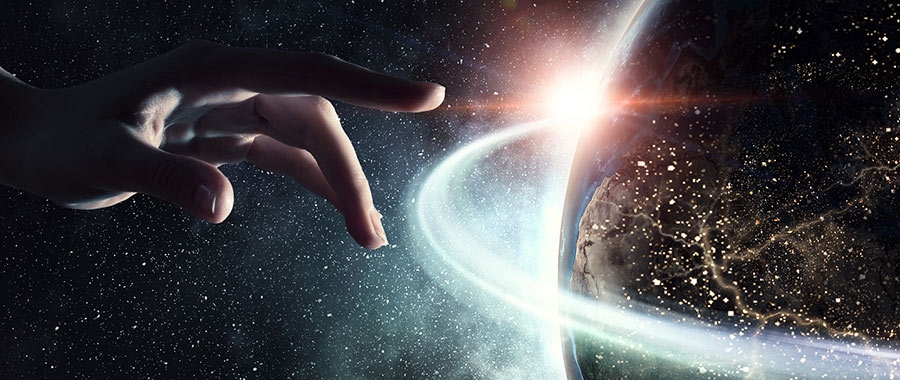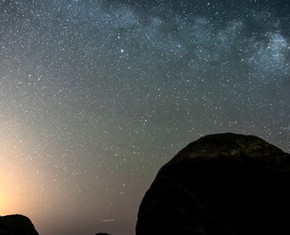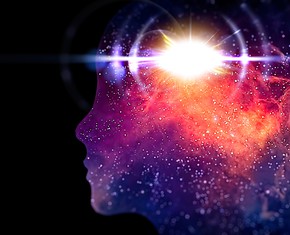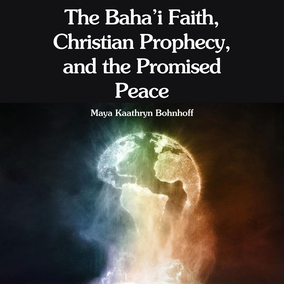The views expressed in our content reflect individual perspectives and do not represent the authoritative views of the Baha'i Faith.
Science and religion are complementary. “Says who?” you ask. Good question. What is “science”? And what, pray tell, is “religion”?
Let’s start with lexical definitions. The Oxford English Dictionary defines “science” as:
A branch of study which is concerned either with a connected body of demonstrated truths or with observed facts systematically classified and more or less colligated by being brought under general laws, and which includes trustworthy methods for the discovery of new truth within its own domain. (4.) In modern use, often treated as synonymous with ‘Natural and Physical Science’, and thus restricted to those branches of study that relate to the phenomena of the material universe and their laws, sometimes with implied exclusion of pure mathematics. This is now the dominant sense in ordinary use. (5b.)
Note here the emphasis on “method”—and hence the familiar term, the “scientific method.” By contrast, religion is not typically characterized as having a method. The Oxford English Dictionary defines “religion” as:
Belief in or acknowledgement of some superhuman power or powers (esp. a god or gods) which is typically manifested in obedience, reverence, and worship; such a belief as part of a system defining a code of living, esp. as a means of achieving spiritual or material improvement. (5a.) A particular system of faith and worship. (4a.) fig., A pursuit, interest, or movement, followed with great devotion. (4b.)
Ian Barbour proposed a four-fold typology of the relationship between science and religion: (1) the conflict view; (2) the integration view; (3) the dialogue view; and (4) the independence view. Mikael Stenmark maps out these four science/religion models in “Ways of relating science and religion” with their respective characterizations in the present writer’s own words:
(a) The Irreconcilability Model: Science opposes religion, and vice versa.
(b) The Reconciliation Model: Science engages religion, and vice versa.
(c) The Independence Model: Science avoids religion, and vice versa.
(d) The Replacement Model: Science supplants religion, and not vice versa.
Arguably the fullest and finest religious example of the Reconciliation Model is that advocated by the Baha’i Faith, one of, if not the youngest, of the independent world religions. A fundamental Baha’i principle is the harmony of science and religion:
And among the teachings of Baha’u’llah [1817–1892, prophet-founder of the Baha’i Faith] is that religion must be in conformity with science and reason, so that it may influence the hearts of men. – Abdu’l-Baha, “Tablet to the Hague,” Selections from the Writings of Abdu’l-Baha, p. 299.
Scientific knowledge is the highest attainment upon the human plane, for science is the discoverer of realities. It is of two kinds: material and spiritual. Material science is the investigation of natural phenomena; divine science is the discovery and realization of spiritual verities. The world of humanity must acquire both. A bird has two wings; it cannot fly with one. Material and spiritual science are the two wings of human uplift and attainment. Both are necessary—one the natural, the other supernatural; one material, the other divine. By the divine we mean the discovery of the mysteries of God, the comprehension of spiritual realities, the wisdom of God, inner significances of the heavenly religions and foundation of the law. – Abdu’l-Baha, The Promulgation of Universal Peace, p. 138.
The Baha’i texts have been quoted at length to give a fair impression of the way in which scientific inquiry is effectively regarded as a divine gift and sacred undertaking. Here, Abdu’l-Baha’s definition of “science” derives from Aristotelian philosophy, not contemporary definitions of science. The Universal House of Justice has stated that religion should be in conversation with the results of scientific method:
The insights and skills generated by scientific advance will have always to look to the guidance of spiritual and moral commitment to ensure their appropriate application; religious convictions, no matter how cherished they may be, must submit, willingly and gratefully, to impartial testing by scientific methods. — The Universal House of Justice, “To The World’s Religious Leaders,” April 2002.
The Baha’i teachings unequivocally insist that empirical science be accepted by religion—just as science ought to respect the moral authority of religion. Theology cannot trump scientific truth. Examples from Baha’i history demonstrate just how seriously this principle has been taken. Baha’i metaphorical interpretation of scriptures not literally in accord with science has a long and rich history.
For example: miracle stories, while claimed in some Baha’i primary sources, are disapproved of at the highest levels, starting with Baha’u’llah himself, who insisted that Baha’i truth-claims categorically exclude the miraculous. Baha’u’llah’s discourses on alchemy are generally regarded as metaphorical. His discourses on medicine are understood as traditional, not scientific, unless so proven. In Baha’i discourse today, Abdu’l-Baha’s statements about “ether” are widely understood as implicating traditional terminology in order to make a point. Some of Abdu’l-Baha’s statements on evolution are interpreted by Baha’i intellectuals as metaphorical, articulated to make a broader point.
The Baha’i faith-community universally embraces modern medical science, and accords science as possessing its own sphere of authority. Yet one of the practical applications of the Baha’i principle of the harmony of science and religion is moral constraint, where religion ought to exert an ethical influence over the uses (and misuses) of science.
In a prescient Baha’i perspective, the distant future looks bright, as science and religion will foreseeably reconcile and, at key points of contact, work in concert. Shoghi Effendi, the Guardian of the Baha’i Faith between 1921—1957, envisioned the golden age of world civilization as a time when complete reconciliation between science and religion will finally be achieved:
In such a world society, science and religion, the two most potent forces in human life, will be reconciled, will cöoperate, and will harmoniously develop. – The World Order of Baha’u’llah, pp. 203–204.
The effort to resolve the tension between science and religion—while bearing in mind that the so-called “conflict thesis” has often been overstated—by asserting their distinctive purposes and methods may oversimplify both the problem and the solution. To suggest that the fundamental conflict is between scientific realism and religious fundamentalism is simplistic in the extreme. There are a range of nuanced views, as Ian Barbour’s four-fold typology of the relationship between science and religion eloquently suggests.
Most religious statements that may appear to be “scientific” (but erroneously so by contemporary standards) should be understood within a historical context, since such postulations are consistent with the natural theology of their time in earlier centuries. Such statements should not be taken seriously as science, since they had nothing to do with science today. Notwithstanding, these distinctions have some utility purely as a general rule. As Albert Einstein famously said:
Now, even though the realms of religion and science in themselves are clearly marked off from each other, nevertheless there exist between the two strong reciprocal relationships and dependencies. Though religion may be that which determines the goal, it has, nevertheless, learned from science, in the broadest sense, what means will contribute to the attainment of the goals it has set up. But science can only be created by those who are thoroughly imbued with the aspiration toward truth and understanding. This source of feeling, however, springs from the sphere of religion. To this there also belongs the faith in the possibility that the regulations valid for the world of existence are rational, that is, comprehensible to reason. I cannot conceive of a genuine scientist without that profound faith. The situation may be expressed by an image: science without religion is lame, religion without science is blind. – Out of My Later Years, p. 26.
The above article is based on this publication: Christopher Buck, “Science and Religion Are Complementary.” World Religions: Belief, Culture, and Controversy. Academic Edition. Santa Barbara, CA: ABC-CLIO, 2013. (Invited student-oriented argument essay.)
You May Also Like
Comments

















Re: Baha’u’llah’s discourses on medicine: Khazeh Fananapazir and Stephen Lambden, “The Tablet of Medicine (Lawh-i Ṭibb) of Bahā’-Allāh: A Provisional Translation.”
Re: Baha’u’llah’s discourses on alchemy: Keven Brown, “A Reflection on the Theory of Alchemy as Explained in the Bahá'í Writings” (2002/2012).
Re: Abdu’l-Baha discourses on evolution: Keven Brown, “‘Abdu’l-Bahá’s Response to Darwinism: Its Historical and Philosophical Context.” Evolution and Bahá'í Belief (Los Angeles: Kalimat Press, 2001), pp. 5–133.
Re: Abdu’l-Baha’s discourses on ether: Keven Brown: “A Bahá’í Perspective on the Origin of Matter,” Journal of Bahá’í Studies 2.3 (1990): 15–44.
See also articles by Moojan Momen, Stephen Lambden and others.
Barbour, Ian G. Religion and Science: Historical and Contemporary Issues. New York: HarperCollins, 1997.
Stenmark, Mikael. “Ways of Relating Science and Religion.” The Cambridge Companion to Science and Religion. Edited by Peter Harrison. Cambridge: Cambridge University Press, 2010. Pp. 278–295.
Cited in: Buck, Christopher. “Science and Religion Are Complementary.” World Religions: Belief, Culture, and Controversy. Santa Barbara, CA: ABC-CLIO, 2013. Invited student-oriented argument essay, demonstrating the present writer’s “CLEAR Argument Paradigm” as a model for writing arguments: Claim (Position), Limits (Qualifier), Evidence (Reasons, Grounds), Assumptions (Warrants & Backing), and Rebuttal (to objections).
“Science is concerned with that which is not confined to individuals; it is the impersonal human world of truths. Religion realizes these truths and links them up with our deeper needs. Our individual consciousness of truth gains universal significance. Religion applies values to truth, and we know truth as good through own harmony with it.”
Comments, such as yours, that provide relevant and useful ...information are ideal. Most comments express approval or disapproval. But your comment is so constructive!